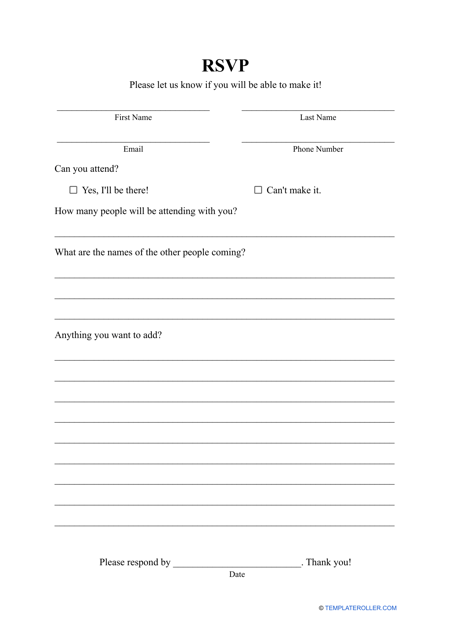Rsvp Template
What Is an RSVP Invitation?
"RSVP" is a term typically found in invitations and it comes from the French phrase "répondez s'il vous plait," simply meaning "please respond." If such a phrase is included on an invitation, it means that the inviting party expects some sort of reply from you, particularly if it is a wedding RSVP. It serves as an important notice to the host to get an idea of the numbers to expect at an event.
An RSVP should clearly specify who is invited. All invited parties need to be included in the RSVP. Sometimes this can include family members, a plus one or is strictly limited to just one person. A printable RSVP template can be downloaded through the link below.
Usually, an RSVP will have information on how to respond as often, this may vary. In the case of a wedding RSVP, this will usually include a special RSVP card and envelope which is required to be filled out by the invited guest. For less formal invitations, there may be other ways of responding - varying from emails to telephone numbers.
How to Fill Out an RSVP Card?
Filling out RSVP cards is not difficult, but it is important to know how to do this correctly in order to not confuse the inviting party. First of all, it is important to understand who is invited. Sometimes, the number of guests can be limited. In other cases, events can be more flexible. Most of the time, an RSVP card will also have a deadline which you need to take into account before responding. It is best to respond as soon as possible. If you are uncertain about attendance, it is considered correct to decline and outline your reasons.
Generally, there are two options for responding. One of them is "Accept," the other "Decline" which in itself is quite self-explanatory. If you are planning on attending the event, tick the "Accept" box and send off your RSVP as soon as possible. If you are not planning on attending, or are uncertain, it is best to decline. If required, it is important to fill in the number of guests you are planning on bringing with you to make sure the host can cater to all numbers.
Sometimes, an RSVP card may only include the phrase "Regrets only," in such cases you only need to respond to the RSVP if you are not planning on attending. If you intend on attending, it is best to not respond at all as this could potentially lead to the host getting confused and misunderstanding your RSVP.
It is considered impolite to cancel an RSVP after you had confirmed attendance. Of course, there are permitting exceptions such as family death or illness. But is important to understand that the host has already taken your attendance into account and has ordered food, entertainment, arranged seats, and purchased gifts with the mindset that you will be present. That is why it is important to consider all factors, particularly availability and finances when making decisions about RSVP responses.
Check out these related topics:




